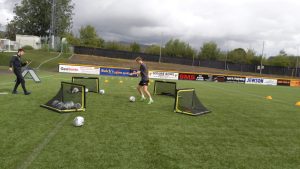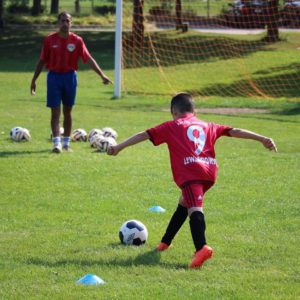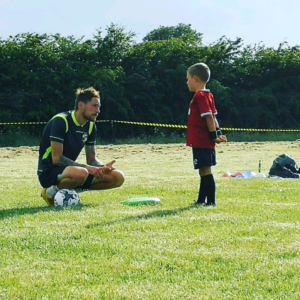"I do extra training every day. I've done that since I was a young boy." - Wayne Rooney
One of my favourite moments as a coach is when player see a situation in a game that has been worked on in practice and provide the solution to make it successful. It's a wonderful thing when everything comes together like that. One such moment happened a few years ago. A player was through on goal wth just the Goalkeeper to beat. She lifted her head, saw the Goalkeeper was starting to get low down and proceeded to chip the ball over her. A few days earlier, we had been working on this technique in a 1 to 1 session.
In the advent of money coming into youth coaching, 1 to 1 sessions have received a bad wrap. Some coaches have seen the opportunity to cash in and sleepwalk through a session. My experience is that these coaches are few and far between. The likes of Saul Isaksson-Hurst has received credit for his work with the likes of Max Aarons. Alloa Athletic put their playes through a Base Line Test prior to the first session commencing. I had a player sign terms with a Football League Club and was pleasantly surprised that he acknowledged my help after working with him on his finishing technique.
1 to 1 Coaching can provide a great benefit to your players in their long-term development and enjoyment of the game. Here are 4 of the reasons why
Target Player Specific Needs

People are complex. No two individuals are the same and this is especially true of children. Every young player you come in to contact with has different physical capabilities, social behaviours and life experiences that impact their psychological state. All of these things come into play in Football, where technical skills and tactical understanding are also added into that mix. Group sessions can help with these, but those 1 or 2 minutes that we get to focus on each individual can only help so far. Private coaching allows us to tailor our sessions specifically for that player.
There was a player I worked with who had the goal of playing in the US Developmental Academy programme. With most USDA clubs favouring a playing out from the back approach, as a centre back it meant that the sessions could be designed to work on skills that would support that. Something that we focused on was him having the ball, facing his own goal and being closed down from behind. We were able to get him looking over his shoulder, view the side of the pressure, step-over the ball and take it the other side, before passing out (aiming for a pop up goal). He was wise enough to do this in his club games and come the tryout it was something that stood him out to the selecting coaches.
Similarly, a less developed player might need to improve their ability to strike a ball with their laces. With many grassroots teams differing in ability levels, 1 to 1 coaching allows players to work on what most benefits them.
Build Confidence on the Ball

During my final year coaching in the US, I coached a U11 Boys team that had just been put together. The players had either been playing Rec (very low level league play) or had not played at all. One of the players had one tactic in the game. If the ball came near him, he kicked it away. While this was better than running away from the ball, it meant that, against players with far more experience than us, we were giving the ball to the opposition. His Mom asked me to work with him 1 to 1.
Over the next 8 weeks the entire focus for him was ball control. I wanted to help him become comfortable using all parts of his feet to dribble, turn and manipulate the ball. It also allowed me to talk with and better find out his mindset when played games. I was delighted to see him successfully navigate the ball past 2 defenders in an end of season game. Even more pleasing was how he did it. There was use of the inside, outside and sole of his foot to move the ball around both players.
I believe that the 1 to 1 sessions allowed the confidence to do this. Some players need added help to move from being someone who likes running around and kicking the balll, to becoming someone who can impact a game.
Develop Advanced Techniques

How many times have you worked with a group of players on putting curl on the ball? Or performing a chip? What about how and when to use the Rabona? My guess is probably not (I appreciate that I might be wrong). Devising a practice that works on these advanced techniques is tough. They're even tougher when you consider the range of abilities in your team. That doesn't mean that certain players won't benefot from working on them.
While some players make take it upon themselves to practice at home, data suggest that children are spending twice as much time playing video games than they are outside. Some players may not even watch the game, thus their exposure to these techniques is even more limited.
A private session allows coaches to develop these techniques. They can be broken down into specific mechanics. Players may even surprise you by finding something that works fro them. The player I spoke about in the intro displayed the techniques we developed on a weekly basis in her games. I believe that she wouldn't have done this without those 1 to 1 sessions.
Create a Better Relationship with the Player

The previous benefits have all been about technical development. It is very important that we consider the person as well. In group dynamics, certain personality types come to the fore. More extroverted players will often dominate these situations. The research shows that in a conversation that involves 6 or more people, 2 people will do more than 60% of the talking. I'll admit that I have given introverted players less attention as a result. It's also fair to assume that those extroverted players behave that way because there is an audience. We don't truly get to see the real them.
1 to 1 coaching provides a more intimate setting in getting to know your players. Less outgoing players are likely to feel more comfortable sharing their feelings. Extroverted players are more likely to speak on a person to person basis, as opposed to becoming the entertainer.
The best managers in the professional game are considered so for their ability to relate with their players as much as anything. This is even more important when working with players who are still growing.


Really appreciate